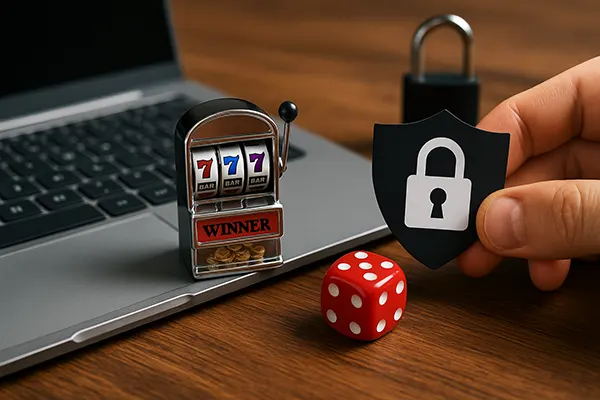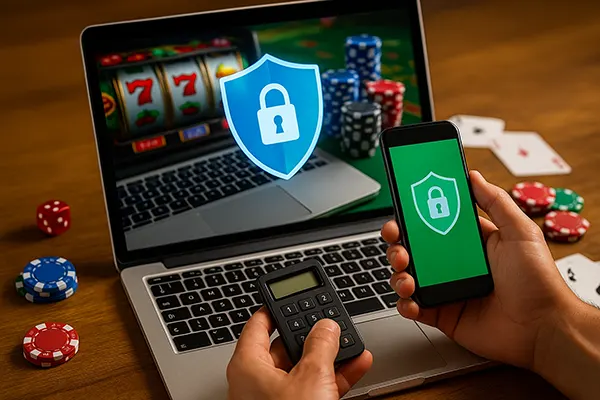How Not to Fall Victim to Scammers: Cybersecurity Guide for Online Casino Players

With the rise of online gambling, players are not only facing the thrill of gaming but also the serious risks associated with cybercrime. Fake casinos, data theft, and phishing scams are just a few of the threats that can affect both novice and experienced users. This guide will walk you through the essentials of cybersecurity in online gambling to ensure your safety remains intact during every session.
How to Identify Fake Online Casinos
Recognising fraudulent websites is the first step toward safer online gaming. Fake casinos often mimic the design and branding of legitimate operators to trick players into depositing money. One of the key red flags includes the absence of a valid licence issued by a well-known regulatory body, such as the UK Gambling Commission, Malta Gaming Authority, or Curacao eGaming.
Another warning sign is the lack of SSL encryption — visible as a padlock icon next to the URL. If the casino website shows “Not Secure” in the address bar, your personal and financial information is vulnerable. These sites also tend to offer unusually high bonuses with vague or no wagering requirements, which often indicates a scam.
Lastly, fake casinos usually lack proper contact information and customer support. If it’s difficult to find a real address, working phone number, or 24/7 support chat, it’s best to walk away. Real online casinos invest in customer service and transparency to maintain user trust.
What to Look for in a Legitimate Casino
Start by confirming the casino’s licence. This information is often displayed at the bottom of the homepage and can be verified through the regulator’s website. A legitimate licence means the operator is held to strict data protection and fair gaming standards.
Next, examine user reviews on third-party platforms. Genuine feedback — both positive and negative — gives a more accurate picture of the casino’s trustworthiness. Be wary of reviews that seem overly enthusiastic or identical, as they could be fabricated.
Finally, check the site’s security protocols. Use a web tool like SSL Labs to test the encryption quality. Secure casinos also publish detailed terms and conditions, privacy policies, and have visible GDPR compliance notices, especially if operating in the EU.
Why SSL Encryption and Updated Software Matter
SSL (Secure Sockets Layer) encryption protects the data transmitted between your browser and the casino’s server. This is essential when entering sensitive details like payment information or personal identity data. A casino without SSL leaves you exposed to hackers and man-in-the-middle attacks.
Even if the site has encryption, it’s crucial that your browser is up to date. Modern browsers like Chrome, Firefox, and Safari frequently patch vulnerabilities. Using an outdated version can expose you to malware, phishing attempts, and fake redirects designed to steal your data.
Additionally, updated operating systems and antivirus software provide an extra layer of defence. These tools help detect and block access to malicious domains, which may be disguised as trusted casino brands.
Browser Settings and Safe Online Habits
Enable HTTPS-only mode if available in your browser settings. This ensures you’re automatically redirected to secure versions of websites. Also, consider using browser extensions that block tracking cookies and alert you to suspicious scripts.
Avoid saving passwords in browsers, especially when dealing with financial sites. Instead, use a trusted password manager with two-factor authentication. This way, even if one device is compromised, your casino credentials remain secure.
Always log out after each session. Leaving accounts open makes you vulnerable to session hijacking, especially when using public Wi-Fi. For an extra safety net, disable autofill for personal data and payment details.

Understanding 2FA and Account Verification
Two-Factor Authentication (2FA) adds a powerful security layer beyond your password. When enabled, it requires a code sent via SMS, app, or email to access your account. This significantly reduces the risk of unauthorised access, even if your password is compromised.
Most reputable online casinos now offer or require 2FA as part of their Know Your Customer (KYC) procedures. KYC verification helps prevent identity theft, money laundering, and underage gambling. Uploading official documents may seem tedious, but it’s a crucial step in protecting both you and the operator.
Don’t ignore these prompts — enabling 2FA can prevent major issues in the event of a data breach. Also, never share verification documents through unsecured channels like email without encryption.
How to Keep Your Account Safe Long-Term
Rotate your passwords regularly and never reuse them across platforms. A strong password includes upper and lower-case letters, numbers, and symbols, and is at least 12 characters long.
Enable account alerts for login attempts, withdrawals, or profile changes. These notifications allow you to act quickly if something suspicious happens. Most casinos provide email or SMS alerts — make sure they’re active.
Lastly, review your account activity periodically. If you notice unfamiliar logins or transactions, contact the casino’s support team immediately and change all associated credentials.
